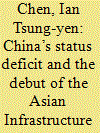| Srl | Item |
| 1 |
ID:
174733


|
|
|
|
|
| Summary/Abstract |
This paper seeks to explore whether the Asian Infrastructure Investment Bank (AIIB) has become an instrument of power led by China to fulfill her geopolitical interests. After an investigation of the AIIB’s power structure, institutional design, and its 34 approved projects, this study finds that although the AIIB deviates to some extent from international standards while considering loan decisions, the bank itself does not appear to be a norm challenger so far. Instead, it has become more cooperative and inclusive, with a shifting focus towards mutually beneficial cooperation and reform of the international financial system. This paper argues that the AIIB's current configuration results from the decrease in China’s status deficit—the gap between China’s recognized international financial status and its own perception of its financial power. Quantitative and qualitative evidence shows that when the idea of the AIIB was first conceived, China’s status deficit was large, which meant that in a global power struggle the AIIB was more likely to be manipulated by a dissatisfied China. As the AIIB evolved, China’s international financial status gained positive recognition and the AIIB received wider acceptance; China’s status deficit shrank. As a result, the AIIB has become a reform-minded multilateral financial institution that has made concessions to establish rules and has sought collaboration with its counterparts.
|
|
|
|
|
|
|
|
|
|
|
|
|
|
|
|
| 2 |
ID:
184722


|
|
|
|
|
| Summary/Abstract |
How do subnational agents exercise policy discretion in the social welfare sphere? To what extent do they do so as a result of various bureaucratic and fiscal incentives? The literature has documented several explanatory frameworks in the context of China that predominantly focus on the realm of developmental policies. Owing to the salient characteristics of the social policy arena, local adaptation of centrally designed policies may operate on distinctive logics. This study synthesizes the recent scholarship on subnational social policymaking and explains the significant interregional disparities in China's de facto urban poverty line – the eligibility standard of the urban minimum livelihood guarantee scheme, or dibao. Five research hypotheses are formulated for empirical examination: fiscal power effect, population effect, fiscal dependency effect, province effect and neighbour effect. Quantitative analysis of provincial-level panel data largely endorses the hypotheses. The remarkable subnational variations in dibao standards are explained by a salient constellation of fiscal and political factors that are embedded within the country's complex intergovernmental relations and fiscal arrangements. Both a race-to-the-top and a race-to-the-bottom may be fostered by distinctive mechanisms. The unique role of provincial governments as intermediary agents within China's political apparatus is illuminated in the social policy arena.
|
|
|
|
|
|
|
|
|
|
|
|
|
|
|
|